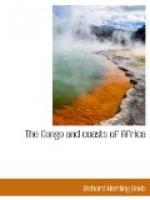One sees more different kinds of black people in Sierra Leone than in any other port along the Coast; Senegalese and Senegambians, Kroo boys, Liberians, naked bush boys bearing great burdens from the forests, domestic slaves in fez and colored linen livery, carrying hammocks swung from under a canopy, the local electric hansom, soldiers of the W.A.F.F., the West African Frontier Force, in Zouave uniform of scarlet and khaki, with bare legs; Arabs from as far in the interior as Timbuctu, yellow in face and in long silken robes; big fat “mammies” in well-washed linen like the washerwomen of Jamaica, each balancing on her head her tightly rolled umbrella, and in the gardens slim young girls, with only a strip of blue and white linen from the waist to the knees, lithe, erect, with glistening teeth and eyes, and their sisters, after two years in the mission schools, demurely and correctly dressed like British school marms. Sierra Leone has all the hall marks of the crown colony of the tropics; good wharfs, clean streets, innumerable churches, public schools operated by the government as well as many others run by American and English missions, a club where the white “mammies,” as all women are called, and the white officers—for Sierra Leone is a coaling station on the Cape route to India, and is garrisoned accordingly—play croquet, and bowl into a net.
When the officers are not bowling they are tramping into the hinterland after tribes on the warpath from Liberia, and coming back, perhaps wounded or racked with fever, or perhaps they do not come back. On the day we landed they had just buried one of the officers. On Saturday afternoon he had been playing tennis, during the night the fever claimed him, and Sunday night he was dead.
That night as we pulled out to the steamer there came toward us in black silhouette against the sun, setting blood-red into the lagoon, two great canoes. They were coming from up the river piled high with fruit and bark, with the women and children lying huddled in the high bow and stern, while amidships the twelve men at the oars strained and struggled until we saw every muscle rise under the black skin.
As their stroke slackened, the man in the bow with the tom-tom beat more savagely upon it, and shouted to them in shrill sharp cries. Their eyes shone, their teeth clenched, the sweat streamed from their naked bodies. They might have been slaves chained to the thwarts of a trireme.
Just ahead of them lay at anchor the only other ship beside our own in port, a two-masted schooner, the Gladys E. Wilden, out of Boston. Her captain leaned upon the rail smoking his cigar, his shirt-sleeves held up with pink elastics, on the back of his head a derby hat. As the rowers passed under his bows he looked critically at the streaming black bodies and spat meditatively into the water. His own father could have had them between decks as cargo. Now for the petroleum and lumber he brings from Massachusetts to Sierra Leone he returns in ballast.




